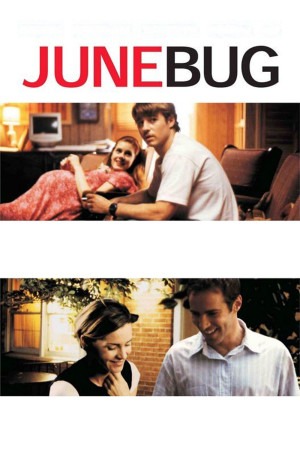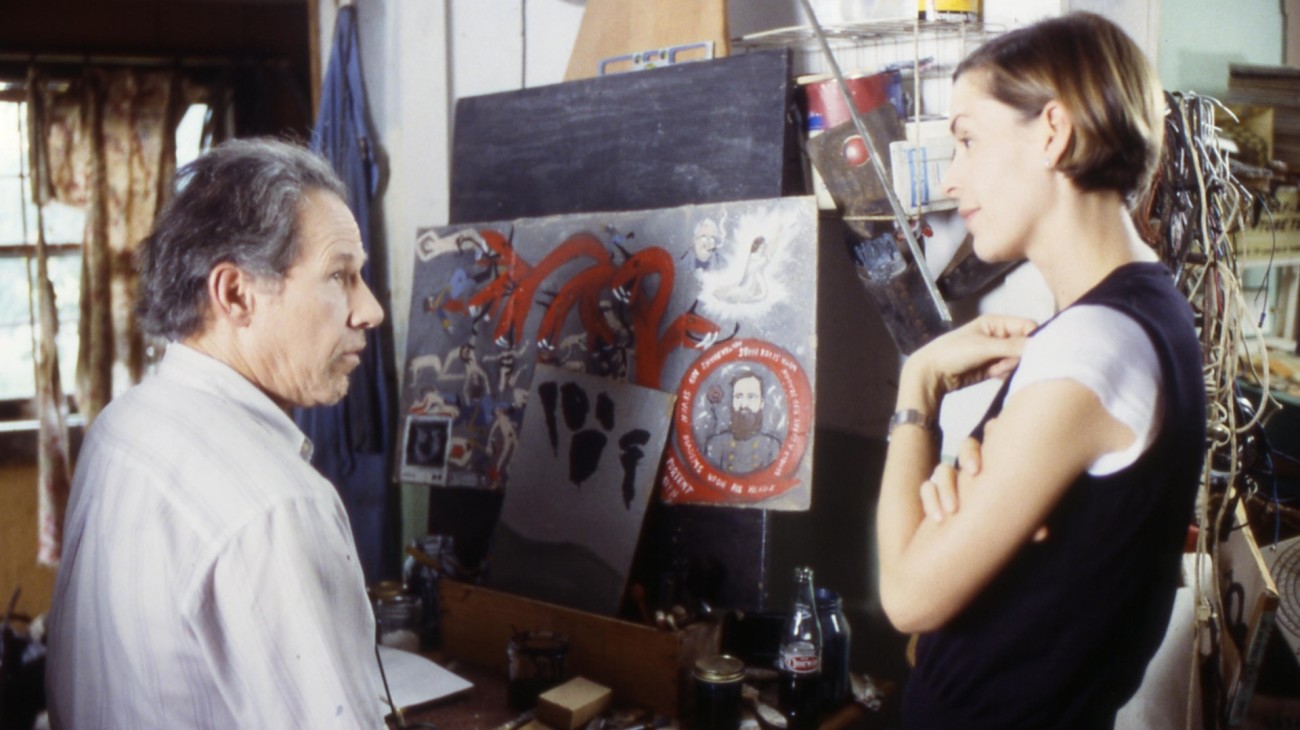
One state, two state, red state, blue state
Junebug, written by Angus MacLachlan and directed by Phil Morrison, is a wonderfully charming chamber piece. It is a perfectly constructed little gem of charm. In fact, it is so charming that you begin to wonder when it will perhaps decide to be maybe a bit less charming, and grow some balls.
That's not actually fair at all. The film is mercilessly pleasant for a very long time, but it is also unceasingly true. It's the story of an "outsider" art dealer (Embeth Davidtz) who meets her new husband's (Alessandro Nivola) family while meeting a painter in North Carolina. Or rather, it is the story of a rural pregnant woman (Amy Adams) who is overjoyed to meet her brother-in-law's urbane new wife. Or the story of her high-school dropout husband (Ben McKenzie). Or the whole clan's parents (Celia Weston and Scott Wilson). It's that kind of film. And if I seem hellbent on naming the whole cast, it's because I need to - every performance, especially Adams' and Davidtz', are flawless.
It is, at its core, a story about the meeting of an urbanite life with a country life. I do not say "conflict," because it isn't: this is a film in which the city girl is not a materialist snob, and the country folks are not illiterate hicks (okay, McKenzie is semi-literate, but it's played for tragedy, not comedy). It is about mutual respect and admiration between people of dissimilar backgrounds. This does not mean it is a dirty damn lie; it suggests how we can rise above the current divide between the city and the rural.
The writing and acting are precise, precise as a perfect clockwork, in evoking the way people act and feel. I don't know that it's because the dialogue is realistic; I don't think that's actually the case. But there is a level of observation which shows that someone was paying very close attention to reality: in one of the film's celebrated bits, mother Peg (Weston) asks father Eugene (Wilson) if he's coming to bed. Not yet, he replies, he has to find his phillips head. Of course he does. Moments akin to this abound.
I cannot explain why without spoiling details I would rather remain silent on, but the third act begins with a contrivance that moderately spoils much of the remaining 20 minutes or so of the film. But it's hardly a "bad" ending, only a disappointing one. The film remains, down to its deeply ambiguous final line, a beautiful and humane and (sigh) charming exploration of the ties that bind a family through difficulties and annoyances. I recall a quote, although I do not remember it's source: "Why are families so easy to love, and so hard to like?" Junebug can't answer, but it certainly makes a good stab at representing the question.
8/10
That's not actually fair at all. The film is mercilessly pleasant for a very long time, but it is also unceasingly true. It's the story of an "outsider" art dealer (Embeth Davidtz) who meets her new husband's (Alessandro Nivola) family while meeting a painter in North Carolina. Or rather, it is the story of a rural pregnant woman (Amy Adams) who is overjoyed to meet her brother-in-law's urbane new wife. Or the story of her high-school dropout husband (Ben McKenzie). Or the whole clan's parents (Celia Weston and Scott Wilson). It's that kind of film. And if I seem hellbent on naming the whole cast, it's because I need to - every performance, especially Adams' and Davidtz', are flawless.
It is, at its core, a story about the meeting of an urbanite life with a country life. I do not say "conflict," because it isn't: this is a film in which the city girl is not a materialist snob, and the country folks are not illiterate hicks (okay, McKenzie is semi-literate, but it's played for tragedy, not comedy). It is about mutual respect and admiration between people of dissimilar backgrounds. This does not mean it is a dirty damn lie; it suggests how we can rise above the current divide between the city and the rural.
The writing and acting are precise, precise as a perfect clockwork, in evoking the way people act and feel. I don't know that it's because the dialogue is realistic; I don't think that's actually the case. But there is a level of observation which shows that someone was paying very close attention to reality: in one of the film's celebrated bits, mother Peg (Weston) asks father Eugene (Wilson) if he's coming to bed. Not yet, he replies, he has to find his phillips head. Of course he does. Moments akin to this abound.
I cannot explain why without spoiling details I would rather remain silent on, but the third act begins with a contrivance that moderately spoils much of the remaining 20 minutes or so of the film. But it's hardly a "bad" ending, only a disappointing one. The film remains, down to its deeply ambiguous final line, a beautiful and humane and (sigh) charming exploration of the ties that bind a family through difficulties and annoyances. I recall a quote, although I do not remember it's source: "Why are families so easy to love, and so hard to like?" Junebug can't answer, but it certainly makes a good stab at representing the question.
8/10
Categories: comedies, indies and pseudo-indies, love stories, warm fuzzies






